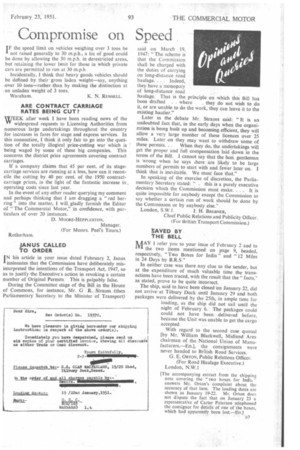Compromise on Speed
Page 41

If you've noticed an error in this article please click here to report it so we can fix it.
IF the speed limit on vehicles weighing over 3 tons be not raised generally to 30 m.p.h., a lot of good could be done by allowing the 30 m.p.h. in derestricted areas, but retaining the lower limit for those in which private cars are permitted to run at 30 m.p.h.
Incidentally, I think that heavy goods vehicles should be defined by their-gross laden weight—say, anything over 10 tons—rather than by making the distinction at an unladen weight of 3 tons.
Wareham. K. N. Russeu...
ARE CONTRACT CARRIAGE RATES BEING CUT?
WEEK after week I have been reading news of the " widespread requests to Licensing Authorities from numerous large undertakings throughout the country for increases in fares for stage and express services. In this connection, I think it only fair to go into the question of the totally illogical price-cutting war which is ' being waged by some of these big companies. This concerns the district price agreements covering contract carriages. If a company claims that 45 per cent. of its stagecarriage services are running at a loss, how can it reconcile the cutting by 40 per cent, of the 1950 contractcarriage prices, in the light of the fantastic increase in operating costs since last year. In the event of any other reader querying my comment and perhaps thinking that I am dragging a " red herring" into the matter, I will, gladly furnish the Editor of "The Commercial Motor," in confidence, with particulars of over 20 instances.
D. MOORE-HEPPLESTON, Manager.
. (For Messrs. Peel's Tours.) Rotherham.
JAN US CALLED TO ORDER IN his article in your issue dated February 2, Janus A insinuates that the Commission have deliberately misinterpreted the intentions of the Transport Act, 1947, so as to justify the Executive's action in revoking a certain number of Original Permits. This is palpably false.
During the Committee stage of the Bill in the House of Commons, for instance, Mr. G R. Strauss (then Parliamentary Secretary to the Minister of Transport)
opeo
said on March 19, 1947: "The scheme is that the Commission shall be charged with the duties of carrying on long-distance road haulage. . . Indeed, they have a monopoly of long-distance road haulage. That is the principle on which this Bill has been drafted . . where . they do not wish to do it, or are unable to do the work, they can leave it to the existing haulier."
Later in the debate Mr. Strauss said: "It is an undoubted fact that, in the early days when the organization is being built up and becoming efficient, they will allow a very large number of these licences over 25 miles. Later on they may want to withdraw some of
these permits.. . When they do, the undertakings will get the proper and full compensation laid 'down in the terms of the Bill. I cannot say that the hon. gentleman is wrong when he says there are likely to be large numbers of permits to start with and fewer later on. I think that is inevitable. We must face that."
In speaking of the exercise of discretion, the Parliamentary Secretary stated: " . this is a purely executive decision which the Commission must make. . . . It is quite impossible for anybody except the Commission to say whether a certain run of work should be done by the Commission or by anybody else."
London, S.W.1. J. H. BREBNER,
Chief Public Relations and Publicity Officer. (For British Transport Commission.) SAVED BY THE BELL MAY I refer you to your issue of February 2 and to "A the two items mentioned on page 9, headed, respectively, "Two Boxes for India" and "12 Miles in 24 Days by B.R.S."
In neither case was there any clue to the Sender, but at the expenditure of much valuable time the transactions have been traced, with the result that the "facts," as stated, prove to be quite incorrect.
The ship, said to have been closedJon January .22, did not arriveat Tilbury Dock until January 29 and both packages were delivered by the 25th, in ample time for loading, as the ship did not sail until the night of February 6. The packages could could not have been delivered before, because the Unit was unable to get the cargo accepted.
With regard to the second case quoted [by Mr. William Blackwell, Midland Area chairman of the National Union of Manufacturers.—Eul, the consignments were never handed to British Road Services.
G. E. Oarota, Public Relations Officer. (For Road Haulage Executive.) London, N.W.1
[The accompanying extract from the shipping note covering the "two boxes for India answers Mr. Orton's Complaint about the accuracy of that item. The loading dates are shown as January 19-22. Mr. Orton does not dispute the fact that on January 23 a representative of Carter Paterson telephoned the consignor for details of one of the boxes, which had apparently been lost.—go.j




















































































